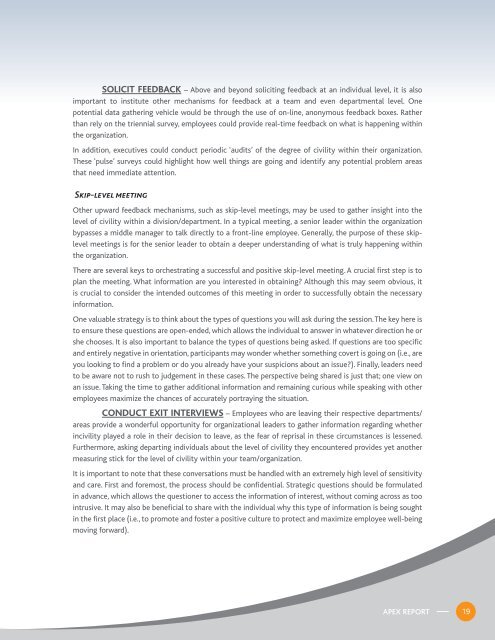CIVILITY MATTERS!
civility report - eng
civility report - eng
You also want an ePaper? Increase the reach of your titles
YUMPU automatically turns print PDFs into web optimized ePapers that Google loves.
SOLICIT FEEDBACK – Above and beyond soliciting feedback at an individual level, it is also<br />
important to institute other mechanisms for feedback at a team and even departmental level. One<br />
potential data gathering vehicle would be through the use of on-line, anonymous feedback boxes. Rather<br />
than rely on the triennial survey, employees could provide real-time feedback on what is happening within<br />
the organization.<br />
In addition, executives could conduct periodic ‘audits’ of the degree of civility within their organization.<br />
These ‘pulse’ surveys could highlight how well things are going and identify any potential problem areas<br />
that need immediate attention.<br />
Skip-level meeting<br />
Other upward feedback mechanisms, such as skip-level meetings, may be used to gather insight into the<br />
level of civility within a division/department. In a typical meeting, a senior leader within the organization<br />
bypasses a middle manager to talk directly to a front-line employee. Generally, the purpose of these skiplevel<br />
meetings is for the senior leader to obtain a deeper understanding of what is truly happening within<br />
the organization.<br />
There are several keys to orchestrating a successful and positive skip-level meeting. A crucial first step is to<br />
plan the meeting. What information are you interested in obtaining? Although this may seem obvious, it<br />
is crucial to consider the intended outcomes of this meeting in order to successfully obtain the necessary<br />
information.<br />
One valuable strategy is to think about the types of questions you will ask during the session. The key here is<br />
to ensure these questions are open-ended, which allows the individual to answer in whatever direction he or<br />
she chooses. It is also important to balance the types of questions being asked. If questions are too specific<br />
and entirely negative in orientation, participants may wonder whether something covert is going on (i.e., are<br />
you looking to find a problem or do you already have your suspicions about an issue?). Finally, leaders need<br />
to be aware not to rush to judgement in these cases. The perspective being shared is just that; one view on<br />
an issue. Taking the time to gather additional information and remaining curious while speaking with other<br />
employees maximize the chances of accurately portraying the situation.<br />
CONDUCT EXIT INTERVIEWS – Employees who are leaving their respective departments/<br />
areas provide a wonderful opportunity for organizational leaders to gather information regarding whether<br />
incivility played a role in their decision to leave, as the fear of reprisal in these circumstances is lessened.<br />
Furthermore, asking departing individuals about the level of civility they encountered provides yet another<br />
measuring stick for the level of civility within your team/organization.<br />
It is important to note that these conversations must be handled with an extremely high level of sensitivity<br />
and care. First and foremost, the process should be confidential. Strategic questions should be formulated<br />
in advance, which allows the questioner to access the information of interest, without coming across as too<br />
intrusive. It may also be beneficial to share with the individual why this type of information is being sought<br />
in the first place (i.e., to promote and foster a positive culture to protect and maximize employee well-being<br />
moving forward).<br />
APEX REPORT 19


